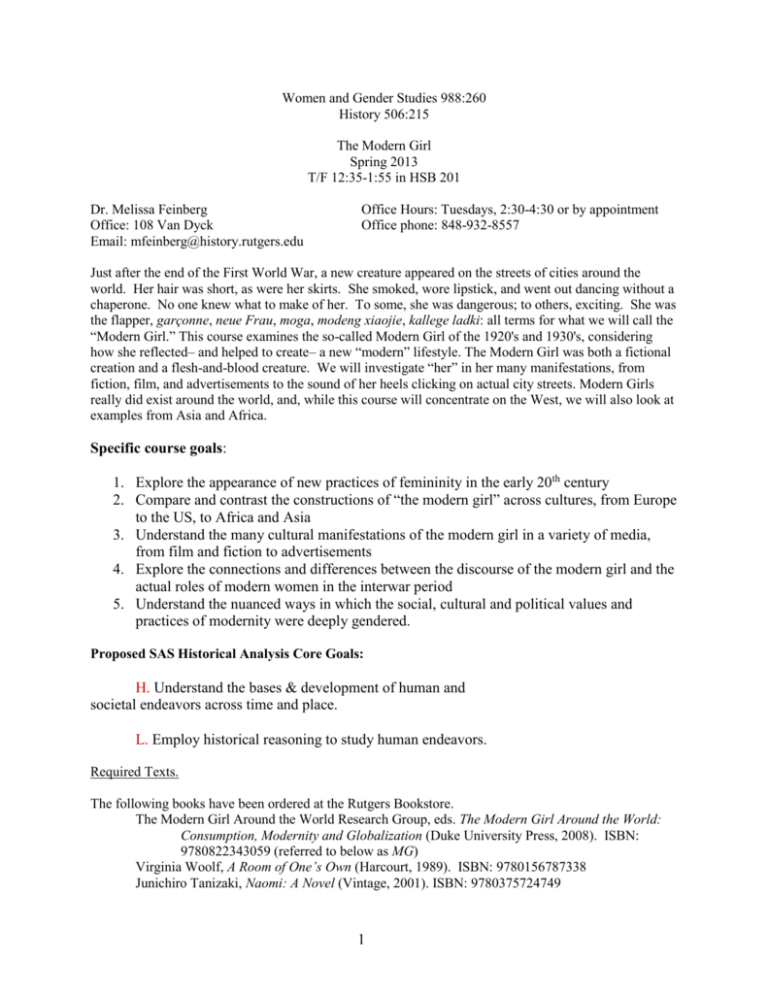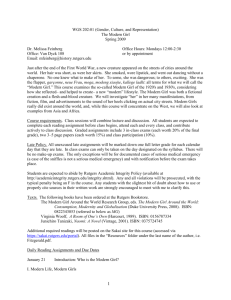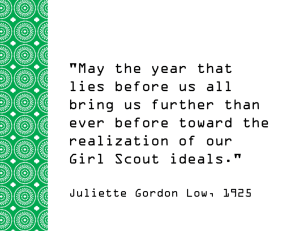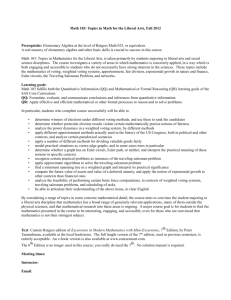506215Syl
advertisement

Women and Gender Studies 988:260 History 506:215 The Modern Girl Spring 2013 T/F 12:35-1:55 in HSB 201 Dr. Melissa Feinberg Office: 108 Van Dyck Email: mfeinberg@history.rutgers.edu Office Hours: Tuesdays, 2:30-4:30 or by appointment Office phone: 848-932-8557 Just after the end of the First World War, a new creature appeared on the streets of cities around the world. Her hair was short, as were her skirts. She smoked, wore lipstick, and went out dancing without a chaperone. No one knew what to make of her. To some, she was dangerous; to others, exciting. She was the flapper, garçonne, neue Frau, moga, modeng xiaojie, kallege ladki: all terms for what we will call the “Modern Girl.” This course examines the so-called Modern Girl of the 1920's and 1930's, considering how she reflected– and helped to create– a new “modern” lifestyle. The Modern Girl was both a fictional creation and a flesh-and-blood creature. We will investigate “her” in her many manifestations, from fiction, film, and advertisements to the sound of her heels clicking on actual city streets. Modern Girls really did exist around the world, and, while this course will concentrate on the West, we will also look at examples from Asia and Africa. Specific course goals: 1. Explore the appearance of new practices of femininity in the early 20th century 2. Compare and contrast the constructions of “the modern girl” across cultures, from Europe to the US, to Africa and Asia 3. Understand the many cultural manifestations of the modern girl in a variety of media, from film and fiction to advertisements 4. Explore the connections and differences between the discourse of the modern girl and the actual roles of modern women in the interwar period 5. Understand the nuanced ways in which the social, cultural and political values and practices of modernity were deeply gendered. Proposed SAS Historical Analysis Core Goals: H. Understand the bases & development of human and societal endeavors across time and place. L. Employ historical reasoning to study human endeavors. Required Texts. The following books have been ordered at the Rutgers Bookstore. The Modern Girl Around the World Research Group, eds. The Modern Girl Around the World: Consumption, Modernity and Globalization (Duke University Press, 2008). ISBN: 9780822343059 (referred to below as MG) Virginia Woolf, A Room of One’s Own (Harcourt, 1989). ISBN: 9780156787338 Junichiro Tanizaki, Naomi: A Novel (Vintage, 2001). ISBN: 9780375724749 1 Additional required readings will be posted on the Sakai site for this course (accessed via https://sakai.rutgers.edu/portal). All files in the “Resources” folder under the last name of the author (i.e. Fitzgerald.pdf.) Course requirements. Class sessions will combine lecture and discussion. All students are expected to complete each reading assignment before class begins, attend each and every class, and contribute actively to class discussion. Graded assignments include 3 in-class exams (each worth 20% of the final grade), two 3–5 page papers (each worth 15%) and class participation (10%). The cutoffs for final grades are: A=90% and above, B+ = 87% and above, B=80% and above, C+ 77% and above, C=70%, etc. You are allowed 3 absences without penalty. If you miss more than 3 classes, your participation grade will drop at least one grade (more for each absence). To report an absence, you can use the university absence reporting website (https://sims.rutgers.edu/ssra/ ). However, reporting an absence or having a doctor’s note does not excuse you from class or allow you extra absences. If you have a serious illness or commitment that will keep you from attending more than 3 classes, you will need to speak with me privately. While attendance is important, it is not adequate in and of itself. To receive an A or B grade in class participation, you must consistently make meaningful contributions to class discussions that reflect a careful reading of course assignments. Being habitually unprepared for class (regardless of your attendance record) will lower your participation grade. Late Policy. All unexcused late assignments will be marked down one full letter grade for each calendar day that they are late. In class exams can only be taken on the day designated on the syllabus. There will be no make-up exams. The only exceptions will be for documented cases of serious medical emergency and with notification via email or phone before the exam takes place. Academic Integrity: Students are expected to abide by Rutgers Academic Integrity Policy (available at http://academicintegrity.rutgers.edu/integrity.shtml). The penalty for plagiarism or cheating on an exam will be an F in the course. Any students with the slightest bit of doubt about how to use or properly cite sources in their written work are strongly encouraged to meet with me to clarify this. Professionalism: It is not acceptable to walk out of class while it is in session; please take care of any personal needs before entering the classroom and expect to stay inside until class is over. While it is fine to use your laptop to take notes or refer to course readings (those in pdf format), it is not acceptable to use computers, cell phones, or other electronic devices for any other purpose while in class (i.e. to send texts, read your email, surf the web, play games, etc). This is a matter of courtesy. Please respect the class and those in it by refraining from such activities during class time. Daily Reading Assignments and Due Dates January 22 Introduction: Who is the Modern Girl? I. Modern Life, Modern Girls January 25 What is Modernity? Katharina Rathaus, “Charleston: Every Age Has the Dance It Deserves” (on Sakai) January 29 Mother of the Modern Girl: The New Woman Mary Louise Roberts, “Making the Modern Girl French” in MG pp.77–95 February 1 World War I and the Birth of the MG 2 Vera Brittain, “War Diary” (on Sakai) Naomi Loughnan, “Genteel Women in The Factories” (on Sakai) Magda Trott, “Opposition to Female Employment” (on Sakai) February 5 Who’s Afraid of the Modern Girl? Bruce Bliven, “Flapper Jane” (on Sakai) Elsa Hermann, “This Is the New Woman” (on Sakai) February 8 Flappers: The MG in the United States Mr. Grundy, “Polite Society,” (on Sakai) February 12 Flapper Comrades? The MG in the USSR Anne Gorsuch, “The Dance Class or the Working Class” in MG pp.174–193 February 15 Modern Girls in China Madeleine Dong, “Who is Afraid of the Chinese MG?” in MG pp. 194–219 February 19 The Modern Girl in Weimar and Nazi Germany Uta Poiger, “Fantasies of Universality?” in MG pp. 317–344 February 22 If Modern Girls Are So Rich, Why Are Women So Poor? Virginia Woolf, A Room of One’s Own, pp. 3–57 February 26 A Literature for Modern Girls? Virginia Woolf, A Room of One’s Own, pp. 58–114 March 1 Exam #1 II. The “Modern Girl” in Literature and Film March 5 Flappers and Philosophers: American Modern Girls in Fiction F. Scott Fitzgerald, “Bernice Bobs Her Hair” (on Sakai) Dorothy Parker, “Mr. Durant” (On Sakai) March 8 The Scandalous Garçonne Victor Margueritte, La Garçonne (The Bachelor Girl), p. 108–163 (on Sakai—IN TWO PARTS!) March 12 The Moga in Japan Junichiro Tanikazi, Naomi, pp. 3–121 March 15 The Perils of the Modernity? Tanizaki, Naomi pp. 122–237 March 18–22 Spring Break March 26 It Girls: Clara Bow and Louise Brooks March 29 Joan Crawford and Greta Garbo Paper #1 (on film) due 3 April 1 Film outside Hollywood: Marlene Dietrich and the Indian sitara Prithi Ramamurthy, “All Consuming Nationalism” in MG 147–173 April 5 Exam #2 III. Material Girls: Consumption, the Beauty Business, and Race April 9 Slim and Streamlined: Modern Girl Fashion Dorothy Parker, “The Standard of Living” (on Sakai) Valerie Steele, Paris Fashion: A Cultural History p. 241–260 (on Sakai) April 12 We All Have to be Skinny Like Coco (Chanel) Margaret A. Lowe, “From Robust Appetites to Calorie Counting: The Emergence of Dieting Among Smith College Students in the 1920’s” (on Sakai) April 16 Lipstick, Powder and a Tan: Cosmetics and the Modern Look Kathy Peiss, Hope in a Jar: The Making of America’s Beauty Culture, pp. 167–202 (on Sakai) April 19 no class April 23 Ponds, Pepsodent and Palmolive Around the World MG Research Group, “Cosmetics Advertising” in MG pp. 25–54 April 26 Race and Standards of Beauty Lynn Thomas, “Racial Respectability in South Africa” in MG pp. 96–119 April 30 Minorities and Metropoles: MG in Australia and Okinawa Liz Conor, “Blackfella Missus,” in MG pp. 220–239 Ruri Ito, “Colonial Modernity” in MG pp.240–262 Paper #2 (on advertisement) due May 3 Passing as a Modern Girl Alys Weinbaum, “Racial Masquerade” in MG pp. 120–146 Nella Larsen, Quicksand, pp. 53–62 (on Sakai) May 9 Final Exam 12:00-1:30 PM 4








